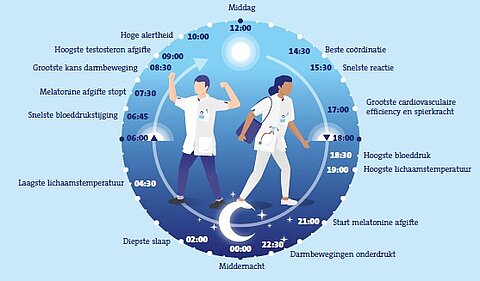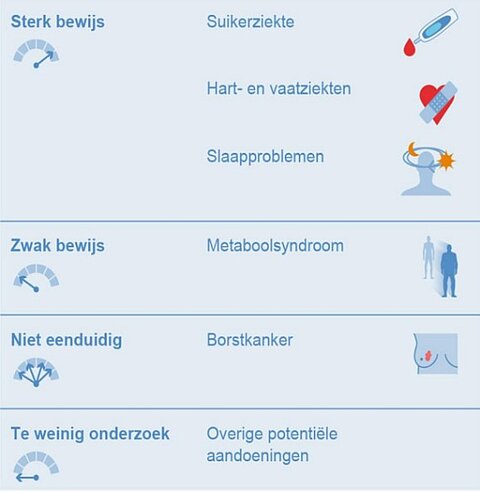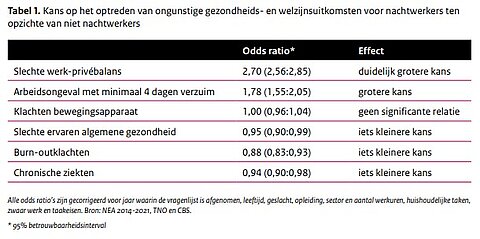Influence on your biological clock
Every person has a biological clock, which ensures that all kinds of processes in the body run in a fixed day-night rhythm. This is also called the circadian rhythm (from Latin: 'about a day'). In most people, the orbital period of the biological clock is slightly longer than 24 hours. To adjust the biological clock to the environment, this internal clock is adjusted every day based on daylight. For example, your biological clock controls:
- when you become sleepy or awake (sleep-wake rhythm)
- your body temperature
- the production of hormones, such as melatonin and cortisol
- your digestion and how your body handles food
These processes are normally well coordinated as long as you are active during the day, when it is light, and sleep when it is dark. Your brain, gut, hormones and even your cells then 'know' what to do and when. There is an optimal 'time of day' for many processes. If all internal clocks are well attuned to each other as well as to the environment, it ensures optimal health.
With night work, you disrupt that natural rhythm of your body. You are then awake and active when your body actually wants to rest (biological night) and you try to sleep while the body is ready to be active. Your behavior is no longer in line with your biological clock and the natural light-dark cycle.
This can lead to all kinds of long-term and short-term complaints, for example:
- Your body gets confused.
Because your organs are active when you should be sleeping, your systems get out of balance. Think of your immune system, blood pressure and metabolism. Everything works just a little less well at the wrong time. - Sleep gets worse.
Normally, your body produces the hormone melatonin in the evening, which makes you sleepy. But if you sit in bright light and are active during the night shift, it inhibits melatonin production, making it more difficult for you to fall asleep when you get home, among other things. You also often sleep shorter and less deeply; This is because your body's biorhythm is simply in daytime mode. - Your digestion gets disrupted.
Your body is less able to digest food at night. For example: your cells respond less well to insulin. Insulin ensures that sugar is absorbed from your blood. As a result, more sugar remains in your blood, which increases the risk of obesity and type 2 diabetes in the long term. Fats are also processed less at night.
Influence on body and mind
A report by the Health Council shows that the risk of health effects increases if you work night shifts more often and for longer periods of time. The advice is therefore to limit night work as much as possible. Therefore, regularly discuss which activities are really necessary during the night shift. And perhaps fewer night workers are needed if procedures are adjusted or if home automation is used.
According to the Health Council, the following health effects of night work have been scientifically proven.
- Sleep problems: night work leads to poorer sleep quality, reduced sleep duration and increased fatigue in the short term. Night workers suffer from sleep problems one and a half to twice as often as day workers.
- Type 2 diabetes mellitus: prolonged night work significantly increases the risk of diabetes. In people who have been doing night work for forty years, it is estimated that one in five diabetes cases is caused by night work.
- Cardiovascular disease: night workers have an increased risk of cardiovascular disease and stroke in the long term. Research shows that among people who do long-term night work (at least forty years of age), almost one in four cases of cardiovascular disease can be directly attributed to working at night itself.
The study 'Insight into the impact of night work and possible solutions' by TNO and RIVM (2023) shows that the risk of a poor work-life balance is 2.70 times greater among night workers than among day workers.
In the RIVM study, night workers indicate that night work means that they can spend less time with their family or partner and, due to fatigue on days off, have less need for social contacts or even avoid them to prepare for the night shift. This does not apply to all night workers. Some indicate that they can combine private tasks better with night shifts than with day shifts. Understanding and support from the environment can help to reduce negative experiences with night work.
In addition to physical complaints, some night workers also experience a negative impact on their mental health. This manifests itself, for example, in less focus and alertness, irritability and gloom. Night workers experience less focus or negative emotions during the night work itself and/or the following day(s), often accompanied by fatigue or lack of energy. Not all interviewees share these experiences. Some report functioning as well as, or even better than, during the day at night. Night workers have different preferences, so customization is important.



